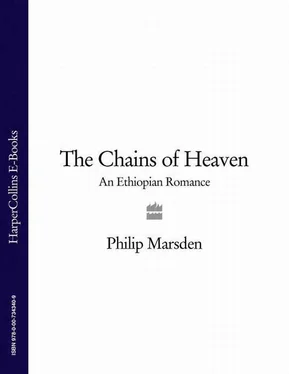We had a problem climbing out of the gorge. The mules reached a slope of bare rock. Their hooves splayed when they tried it. They slid back. Bisrat and Makonnen freed them of their loads. I looked at the angle of the rock face and thought: this is impossible. Hiluf shook his head. So what now? This was the only path. There were no bridges—the Sekota road was a day’s walk in the wrong direction. In the rains the entire area was cut off.
The first mule tried again—and slipped back. Bisrat put a rope around her halter and tugged. Makonnen pushed from below. Three, four steps up. She sidestepped, away from Makonnen. Then they were both sliding. Below them was a gully which dropped sheer to the river below. Makonnen cried out. Bisrat yanked. The mule stretched her chin but her legs were floundering. Makonnen was on his knees, on the very edge of the gully. Bisrat pulled again. ‘ Ayzore! Ayzore! ’ One of her sliding feet gained purchase. Then the others. The second mule followed more easily.
Makonnen was grinning as he reloaded. Relief drove a monologue, delivered in an intermittent falsetto. ‘Oh be praised, Mother of God…keep us safe from danger and bless this road which is so steep…which is so difficult…oh Lord, this terrible road, it is too steep.’ His hands were shaking.
Above the cliff, the path levelled out. It crossed an area of terraced plots; we were joined by a man with a mattock over his shoulder. He saw the sweat covering my face and neck.
‘We were born to suffer on these roads. But why the farenj ?’
His village was a speckle of brown huts high above us. Twenty or thirty people gathered as we stepped between brush fences. A young woman served us tella from a cool earthenware jug. She had a certain way of holding the jug and half-hiding her face. Makonnen held out his mug to refill; he was still animated from earlier, and he gave her a conquering smile.
It was already evening when we cleared the ridge. A cold wind swept up to meet us. A whole new world opened at our feet—grey cliffs and islands of yellowy fields wherever the ground was level enough. To the west, cloud hid the late sun. The strip of sky beneath was a fierce liquid orange.
‘ Hard land,’ mused Bisrat, letting out a low whistle. ‘Hard land.’
Just below was a lone pair of huts. Above the wind, I said: ‘What about there, Hiluf?’
‘We’ll send the others ahead.’
‘They might object to me?’
‘Also me!’
Bisrat and Makonnen came back flanking a wiry old man called Teshome. It was all fine. We led the mules through a gap in the fence. We bought feed from Teshome and put up the tent.
I sat and loosened my boots. This was a lot tougher than I’d expected. The relentless up and down: up, when each step was an effort; and down, when your knees were constantly flexed and you had to watch every footfall on the bare rock, or on the loose sliding stones.
I took a long swig of water. Today’s intake: three and a half litres. And to eat: a few biscuits at midday; in the morning, half a bowl of last night’s spaghetti; now some packet soup and a tin of sardines. I could feel the dizziness from too much sun. I unpacked the stove and again the subversive thought came: buses—rattling boneshakers, rolling kilns on wheels, happily pushing back the miles towards Aksum!
Later, after the sun and the temperature had dropped, we sat with Teshome in the moonlight. Two families lived up here—two old men, two elderly women, two young women and a very large number of children. The young men, said Teshome, had taken the livestock to the lowlands.
In 1984, when the BBC first aired footage of the Korem feeding camp, many of those staring faces came from this area. The Derg had lost the entire region to the rebels. But the rebels could not cope with the famine. I asked Teshome about that time. In the Ethiopian calendar it was 1977.
‘ Sabat-sabat ?’ He stared at me without expression. ‘You must not even talk of it.’
‘How was last year’s harvest?’
‘The crop was destroyed by hail.’
He looked away. In the pale light, his profile was impassive. ‘My God,’ he hissed, ‘save us, have mercy upon us.’
The next morning we left early. Teshome walked with us. The descent continued in a series of giant steps. A troupe of gelada baboons was feeding below. Teshome picked up a handful of rocks and we all joined him, pitching the rocks and shouting. The baboons loped off across the stubble.
We said goodbye to Teshome.
‘You will reach Arzilo tomorrow,’ he said. ‘Amda Worq is not half a day from there.’
We dropped to the next layer of terraces. When I looked up Teshome was still there above the cliff, watching us go. The baboons were waiting in the trees.
We were resting at the top of a pass. The mules were nosing the dust for food when we heard whistling from below. It was a man with a goat. Over his back was a masenqo, a single-stringed fiddle and bow.
He joined us in the shade and, placing the masenqo between his knees, looked at each one of us. Then he started to play.
‘People travelled far like the clouds but could not find the way back to their home. Wherever we may wander Please God make sure we find our way home So that we may not perish in the desert.’
He was an azmari, one of a caste of wandering musicians. He had been playing at a three-day wedding; the goat was his payment. Now he was on his way to another wedding near Bilbala.
‘The best sorghum can be found in the region of Yejju. A man with a good baby will forever be remembered by that child.’
He gave an ambiguous grin. Ambiguity is the azmaris ‘ stock in trade, the basis of their verses. It is also what makes the azmaris the most revealing aspect of all Ethiopian secular culture. Some of their verses are traditional, some direct, some spontaneous compositions about those present. But the most popular carry in them a heavy load of meanings, puns and allusions—and the heavier the better. ‘Weighty verses,’ goes the Amharic saying, ‘warm the insides like warm clothing.’
This style of figurative song has its own figurative name— samenna worq (’wax and gold’). To sculpt a gold figure, a clay cast is formed around a wax representation. The cast is heated, the wax pours out and the gold is poured in; once cooled, the cast is broken and the gold figure uncovered. Likewise azmaris compose verses that have an initial ‘wax’ meaning, and a more hidden ‘gold’ meaning. (For those who find ‘wax and gold’ too simple, there is an even trickier form known as wasta wayra— ‘inside the olive tree’, olive bark being a very different colour to the wood.)
The anthropologist Donald Levine named his classic Amhara ethnography simply Wax and Gold. Working in prerevolutionary Ethiopia, he saw the verses as central to an appreciation of an entire way of thinking. ‘Wax and gold represents more than a principle of poetic composition and a method of spiritual gymnastics… Samenna worq colours the entire fabric of traditional Amhara life’.
He quotes an example:
‘Etsa balas balto addam kanfareshe Madhene alam lebe tasaqala-leshe.’ (Since Adam—your lip did eat of that tree The Saviour—my heart has been hung up for thee.)
This is pure wax and gold, in which the two meanings sit one above the other—Adam/lip and Saviour/heart. The wax meaning is: Because Adam ate of the Tree of Knowledge/The Saviour of the World has been crucified for you. The gold meaning shimmers beneath. It depends on the verb tasaqala being a synonym for ‘was crucified’ and ‘is anxious to be near’. So listeners would smirk when behind this piety they heard: ‘Because of your [tempting] lips/My heart is anxious to be near you.’
Читать дальше











